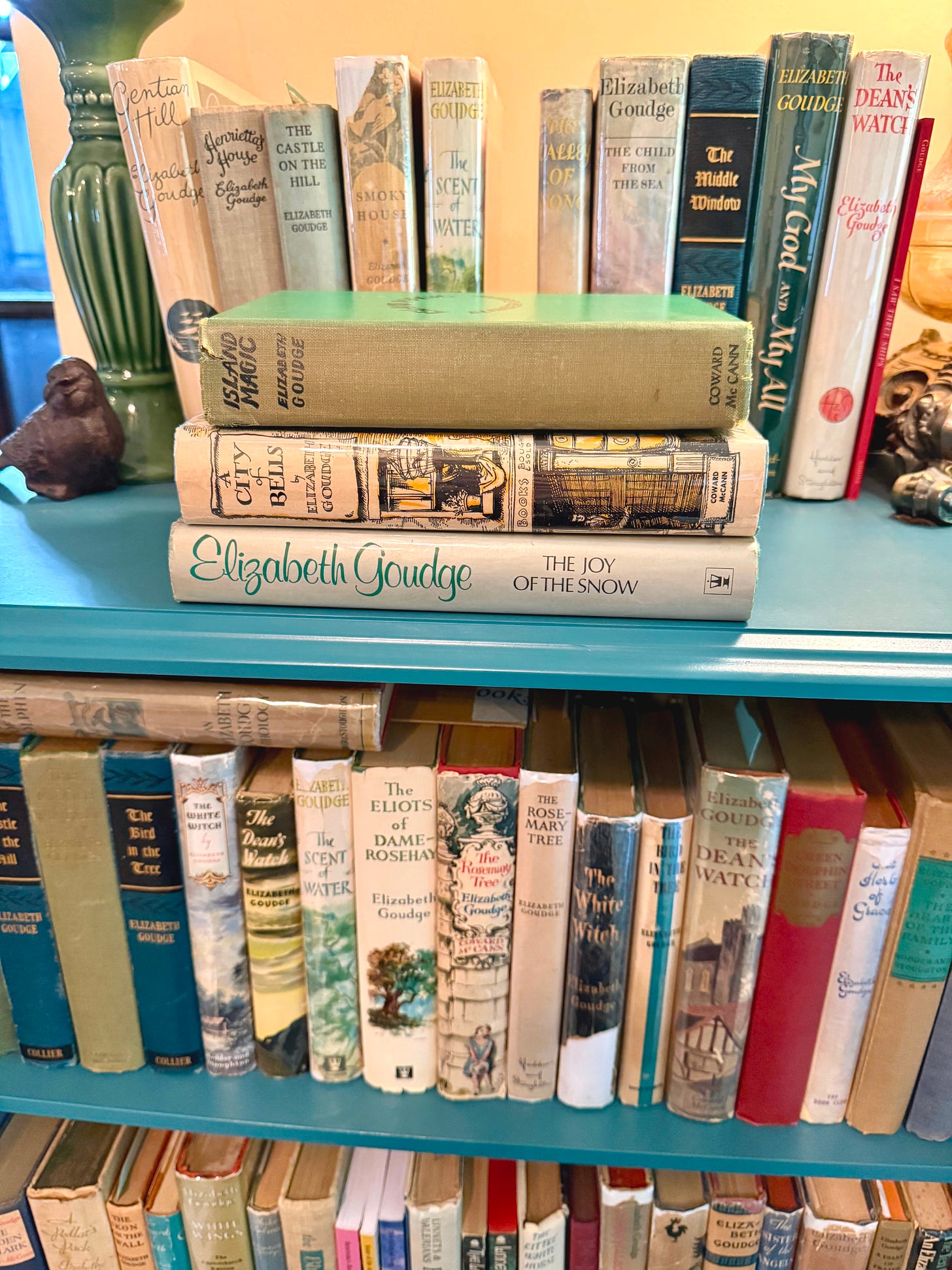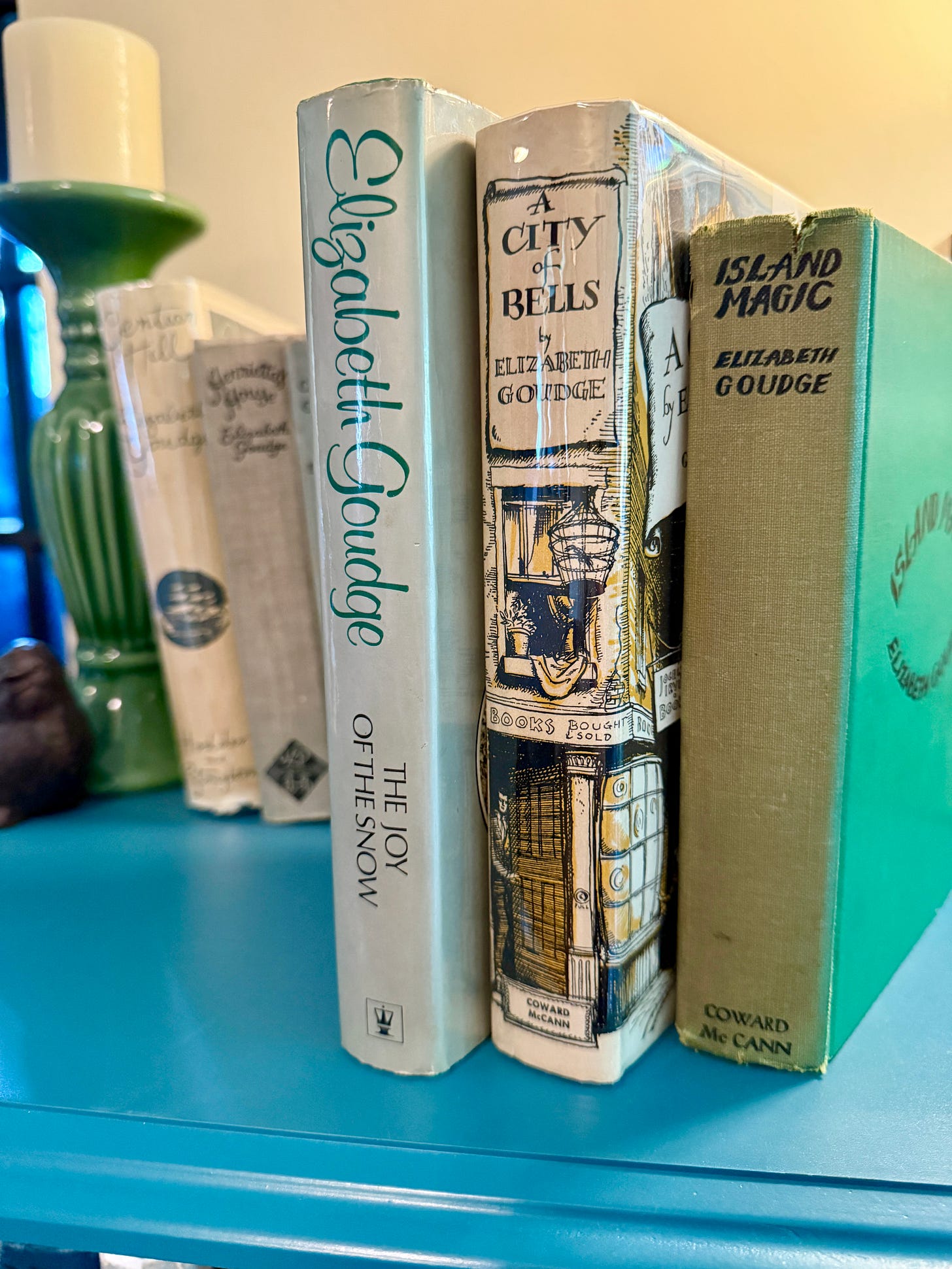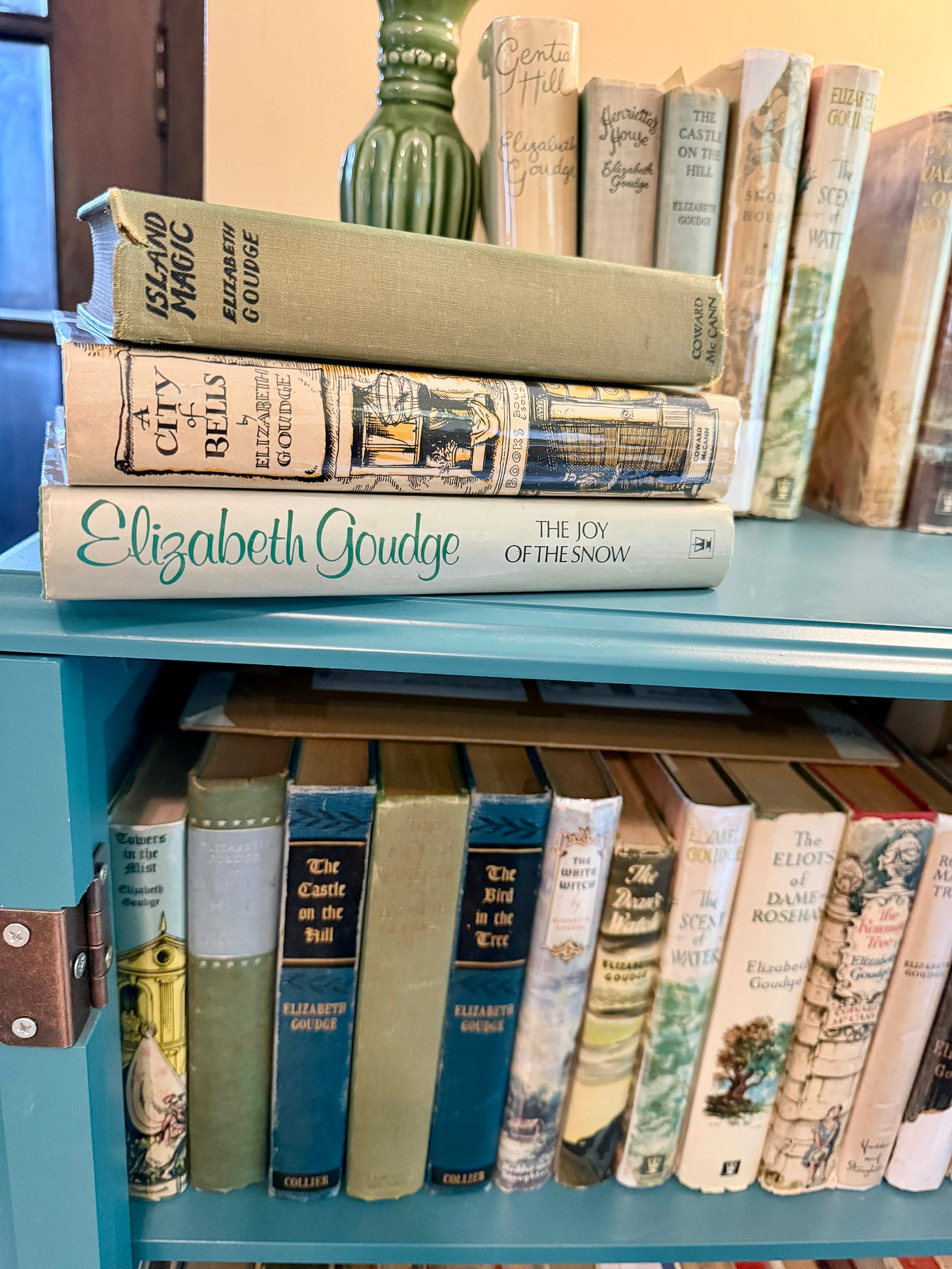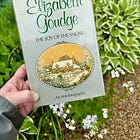
“Writing is more a matter of practice than anyone realises.
Words to a writer are the same as bricks to a builder.
It is necessary to learn about their size and shape and how to put them in place…”
💙 Elizabeth Goudge, The Joy of the Snow
Elizabeth Goudge, storyteller and writer
Goudge says quite a lot, both in her novels and in her autobiography, about the art and craft of writing. She had quite a few friends we were writers later in life, as well as being the president of a writing club, and so in her 70’s she was able to venture some more general answers about being a writer.
Here is a collection of quotes from Goudge on the art of storytelling and the hard work of writing from The Joy of the Snow:
“This seems the place to apologise for a maddening habit of which I think most novelists are guilty. We give a story the setting of a place or countryside that we love but we are not accurate. Our memories go down into the subconscious, get overlaid with one thing and another and are fished up again anyhow and pieced together with the glue of sheer inventiveness… I know perfectly well that if we are writing of a real place we should get the map out and check up on our facts. But then we are not writing history, we are writing a story, and the temptation to alter or improve on the facts for the good of the story is impossible to resist.”
“In our hearts every one of us would like to create a new world, less terrible than this one, a world where there is at least a possibility that things may work out right. The greatest writers are able to do this. In The Lord of the Rings Professor Tolkien has created a world that is entirely new and if the book ends in haunting sadness, Frodo and Sam do at least throw the ring in the fire; if it had been in this world that they embarked on their terrible journey they would have died half-way up the mountain. And so, even with lesser writers, a story is a groping attempt to make a new world, even if the attempt ends in nothing better than the rearrangement of the furniture.”
“Writing a book is much the same as any other kind of creative work, painting or carpentry or embroidery or having a baby, an act compounded of love, imagination and physical labour. And if a mother were to tell me that you do not need imagination to produce a baby I should answer that love and imagination cannot be separated. When a woman falls in love with a man it is as though she opened Pandora's box; all her longings and imaginings fly up and he is gilded with her dreams. And when the man's child is conceived it is the same; her love spins all sorts of golden imaginings about it. When neither turns out to be as ideally perfect as had been expected, well, by that time she is immersed in domesticity and hard work is full of comfort. A book begins with falling in love. You lose your heart to a place, a house, an avenue of trees, or with a character who walks in and takes sudden and complete possession of you. Imagination glows, and there is the seed of your book.”
“I owe my readers an incalculable debt, which I shall never be able to pay. I am not only grateful that they need me at all, I am even more grateful for the affection which for forty years they have expressed in so many delightful ways.”
On the writing process
“I have never tried to do carpentry but I am sure the process is much the same. The love of the wood, the feel of it in the hands, the glow in the mind and then the slow labour of craftsmanship. With a book this labour is so slow that though writers will tell you they love their work, yet they never want to do it. A book existing in the mind is one thing, enclosed there it is delightful company, but when the glow becomes an explosive personality demanding to get out that is quite another. It must be got out, or the writer will go mad, but getting the thing down on paper is a grinding slog. The thought of starting the process yet again fills one with dark despair. Anything not to start. I heard Joyce Grenfell say once in a broadcast that whenever she knew she must get down to writing a sketch she remembered it was her duty to do some very elaborate cooking. I have heard of writers who had to be locked in their workrooms by their irritated relatives before they could be induced to make a start.
I don't know what other writers do in this miserable condition. I only know what I do: Sit down at the appointed time for work and stare in terror at the empty sheet of paper before me. How many of these blank white papers must be covered with hideous black marks before the book is finished? Hundreds of them. But what a crazy way to earn a living, making dirty marks on clean paper. Of what use can they be to anyone when made? None. Yet what else can I do? What else am I fit for? Nothing. Better make a start, turn the tap on (that means grip the pen with loathing) and see what comes. Nothing comes. There is an airlock somewhere. No good. Try again tomorrow. One tries again tomorrow for several days and then the airlock suddenly yields and there's a small trickle of water. A couple of pages are made a mess of. Next day they are read over, found to be hopeless and torn up. The process is repeated and then suddenly one happy day the tap is running freely; unbelievably one is once more writing a book. For a short while that is. Then comes another airlock, and then another, until the first draft of a book is finished at last. Now it is there, out of us, and we feel what the carpenter feels when the chair is formed and in being. Now he has only to correct his mistakes as well as he is able, to smooth the wood and polish it. The rewriting of a book, and when the time comes the correcting of the proofs, is pure joy.”

Goudge’s early books mentioned extensively in the first chapters of The Joy of the Snow: A City of Bells and Island Magic. Goudge on her parents’ gifts
“Have there been other writers in your family? The only writer was my father but the single likeness between us was an inability to compose on a typewriter; neither of us could think without actually holding a pen in the hand… I can remember with what joy we sat on the floor together packing up the typescript of his last book for despatch to his publisher. The task completed we sat back on our heels and contemplated the neat parcel (the floor is the only place where anyone can make a neat parcel of a big bundle of typescript) with hearts swelling with thankfulness. Months of dogged perseverance had brought a creative act round full circle to its completion. A book was written. It was going out into the world. Our eyes met and we smiled. ‘They are our children, aren't they?’ said my father. The humility and gentleness with which he spoke seemed to gather his books and mine into one family. I had never felt so close to him or so happy.”
“My mother was a wonderful storyteller and a witty, fascinating conversationalist but she was no good with her pen. That a woman who talked so delightfully and so fluently should have written such uninspired letters is perhaps not so surprising for the two gifts seem to belong to different types of people. ‘My tongue is the pen of a ready writer,’ said the Psalmist and one imagines that a scribe, and not himself, wrote down his songs. He sang and danced his joy, he was ready with his tongue and feet but not with his pen. He had the older, the lovelier and more enviable gift. Lovelier because more fleeting, enviable because it is the actual breathing magic of the person. Men danced and sang and told stories long before they wrote and the story sung before the fire by the ready tongue, the eyes of the singer darkening or shining with the alternate joy and sorrow of the tale, was in comparison to a written story as the living butterfly to one pinned out flat upon a collector's board.”

“Storytellers, writers, readers aloud, I think they come in that order, for until the story is written down the readers aloud cannot come into action. But theirs is a splendid gift, akin to that of the actor; and perhaps the actor came upon the stage of history very early indeed and was acting out in song and dance the splendour of war and the glory of the beasts even before the painters portrayed them in line and colour on the walls of their caves.”
💙 Elizabeth Goudge, The Joy of the Snow












I love her discussion of how writing is like carpentry. Everyone knows how to write, but creative writing is a skill, like playing the violin or making a table, that must be fostered in order to better express our creative ideas.
On days when writing feels pointless, I often think of this line from The Scent of Water: "The poets did at least put it into words for you and ease the pain of it.”
I love how she compares writing to having a baby. I have had 10 babies, so it makes me feel like I have done something creative when she describes how love and imagination are bound together. And she says "a book begins with falling in love".